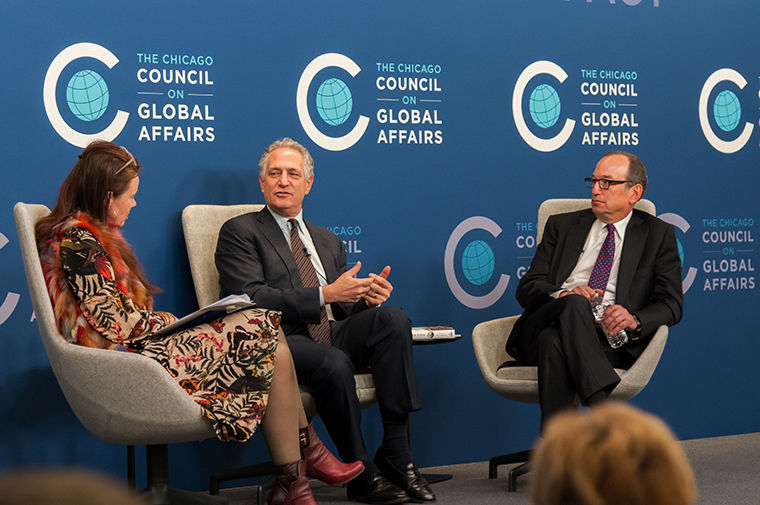Chicago vs. New York City: Former deputy mayors compare city vitality, growth
Former New York Deputy Mayor Dan Doctoroff (left) and former Chicago Deputy Mayor Steve Koch (right) discussed how the two municipalities can compete as global cities with the Chicago Council on Global Affairs.
November 13, 2017
Great cities are those that change the world, said Steve Koch, Chicago’s former deputy mayor.
“From the Highline to the 606”—a Nov. 9 panel discussion hosted by the Chicago Council on Global Affairs and moderated by Niamh King, the group’s vice president for Programs and Strategic Content—included Koch and Dan Doctoroff, former New York City deputy mayor. The pair compared New York City and Chicago and discussed strategies to bring corporate investment and vitality into the cities.
“Cities are like people. They have a personality and culture and every city is different,” said Doctoroff, who was deputy mayor from 2001 to 2008.
Chicago differs from New York City because the latter is the financial capital of the globe, said Koch, who was deputy mayor from 2012 to August 2017. In the next five or 10 years, 20 to 30 other global cities will be the new hotbeds of innovation, creativity and economic growth, and while New York City will always be a global city, Chicago has to work for it, Koch said. “In many ways, [Chicago] is a big financial player, but we are not a political or financial capital, and if we don’t take steps of our own initiative, we become irrelevant,” Koch said.
Another difference between New York City and Chicago is the crime rate. Doctoroff said New York City has made a consistent effort to put law enforcement on the streets of troubled neighborhoods and hold police accountable. New York also does not have as many gang-related issues as Chicago, he added.
“The predicate for the success that we’ve enjoyed [in New York City] is based on the reduction in crime,” Doctoroff said. “There is nothing more important at the end of the day to the success of the city than people feeling safe.”
Both agreed population is key to economic success for global cities, and the overall population growth has been dramatically greater in New York City than Chicago.
In the last 15 years, New York City has grown by 500,000–600,000, and new residents have spread into every one of its neighborhoods, Doctoroff said.
“We’ve created a vibrant market in most neighborhoods; whereas [in Chicago], there are whole areas that remain blighted because you don’t have the demand,” Doctoroff said. “In those areas where there is not demand or opportunity, there are going to be problems.”
Koch said deteriorating cities tend to lose population. John Bucksbaum, CEO of Bucksbaum Retail Properties, said the panel put population in perspective as a city’s economic issue, a concept he had not realized before attending. Population brings people who generate investment, he said.
Over the last six years, several hundred companies and more than 50,000 jobs have moved to Chicago, boosting the population and growth of the middle class economy in Chicago, Koch said.
“Population growth is an enormously important phenomena,” Koch said. “The real challenge for Chicago going forward is how to make it a livable city.”








